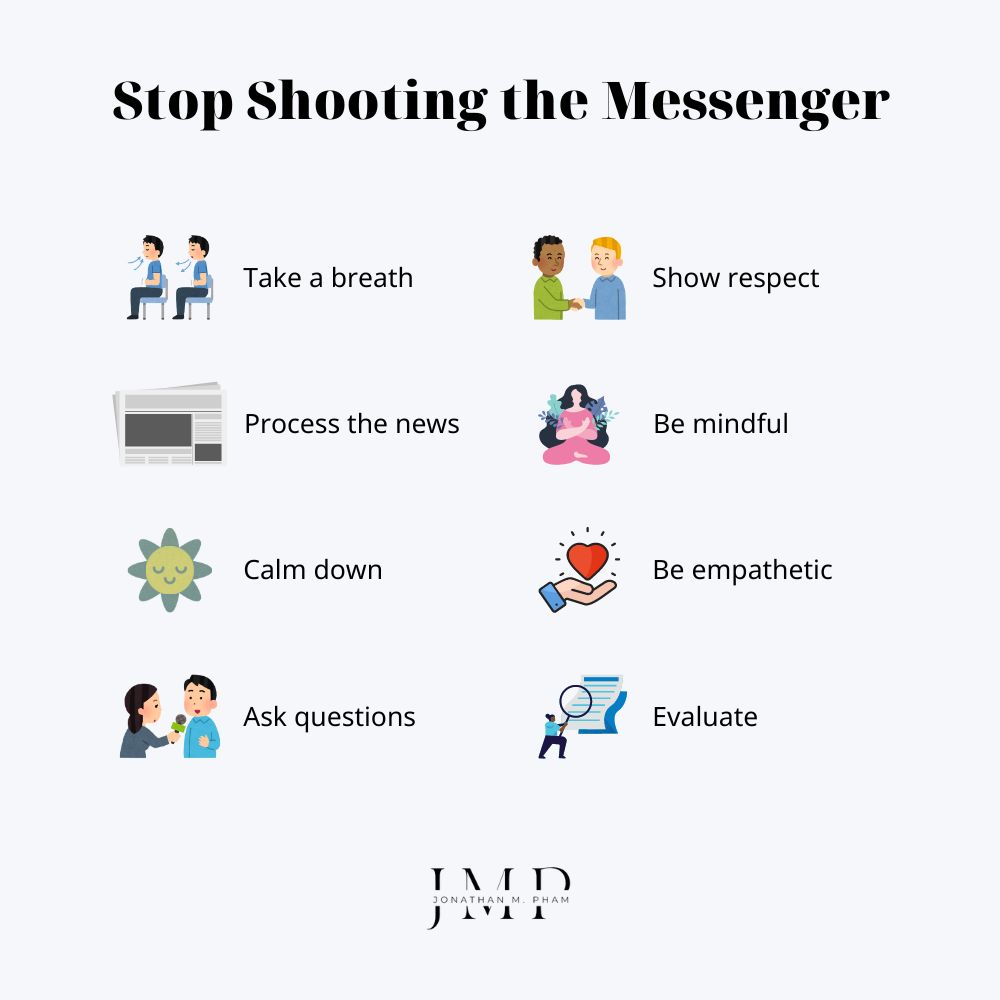Shooting the messenger is a bad habit we commonly engage in, and its repercussions are not to be underestimated.
Shooting the messenger is a common, yet intriguing behavior in people’s daily interactions. Whether it’s an unsettling report at the office, a harsh truth from a friend, or distressing news delivered by a loved one, we often find ourselves instinctively blaming the bearer of those bad tidings. The question is: Why? What drives us to shift responsibility onto those who have nothing to do with the problem at hand?
Highlights
- The phrase “shooting the messenger” refers to the act of blaming someone for bad news, even though they are not responsible for it. It is often attributed to psychological factors such as the need for sense-making, fear of change, and defense mechanisms.
- Shooting the messenger is a biased, illogical, and harmful behavior that hinders information flow, damages relationships, and undermines effective problem-solving. Within an organizational setting, it is a cause of damaged trust, crippled communication, and increased hostility.
- To overcome this bad habit, one should utilize tactics such as taking a deep breath, processing the news calmly, avoiding focusing on the messenger, asking clarifying questions, showing respect, being mindful of personal biases, and cultivating empathy and gratitude. Above all, they need to learn to say “thank you” in all circumstances.
What is Shooting the Messenger?
“Shooting the messenger” is a figurative expression that refers to the act of blaming people who bear unfavorable news – even though they are just playing the role of a messenger and not responsible for it. The phrase’s roots may be traced back to ancient Greece, where messengers were sometimes met with violent responses for bringing bad tidings.
Throughout history, the concept has been deeply ingrained in literature and culture, exemplified in stories such as Plutarch’s Lives, where a king named Tigranes beheaded a messenger who delivered news of an enemy’s arrival. Similarly, in Sophocles’ Antigone, there’s a line like this, “No one loves the messenger who brings bad news.”
Even in contemporary times, people still commit this destructive behavior. Also referred to by other names such as killing/ attacking/ punishing the messenger, it is observed when people receive distressing news – and their first action is to instinctively lash out at the one telling them that information, rather than addressing the underlying issue.
Real-life examples:
- An employee receives notice of being laid off. They then direct their anger toward the manager or supervisor, even though the decision to lay them off is beyond the manager’s control.
- A worker receives a disappointing grade on a feedback evaluation. They react by yelling at the one who hands the result to them.
- A dissatisfied customer vents their frustration at a customer service representative, who is only trying to help them and has no control over the product’s quality or the company’s policies.
- etc.

Blaming the bearer of bad tidings
Why Do People Like to Shoot the Messenger?
Far too often, we blame people who inform us of unfavorable information. The question is: Why?
The inclination to “shoot the messenger” may be attributed to several psychological and emotional factors that influence human behavior in response to bad news:
Sense-making & attribution
A study by Harvard University revealed that when confronted with unexpected things, people often try to make sense of the situation so that they may regain a sense of control. This natural need for predictability drives us to look for someone to blame, even if the messenger is not responsible for the problem we are facing.
Human cognition tends to attribute negative motives or incompetence to those who deliver bad information, as they are seen as the bearers of disturbing changes that challenge established expectations or norms.
Fear of change
Bad news often implies upcoming changes that may be either unsettling or intimidating. The fear of uncertainty is a common trigger of defensive reactions; in this sense, shooting the messenger becomes a way to indirectly express resistance to change.
Directing our frustration at the messenger is a sign of us resisting/ denying the necessity of change, instead seeking to maintain the status quo.
Defense mechanism
Some view the act of shooting the messenger as a defense mechanism to cope with uncomfortable or threatening information. It enables them to avoid confronting the reality or the problem’s actual source.
Instead of addressing the issue, they redirect their emotions toward the messenger so as to alleviate some of the distress that arises from the bad news.
Expression of anger
The reception of bad news often triggers feelings of frustration. People may then direct their anger toward the person perceived as responsible for the distressing situation.
In such instances, the messenger inadvertently becomes a convenient target for pent-up emotions, despite having nothing to do with the problem.
We Shoot the Messenger More Often Than We Think
(This section, along with the “Thank you” part below, is compiled with inspiration from Habit #18 discussed in the bestseller ‘What got you here won’t get you there‘ by world-renowned executive coach, Dr. Marshall Goldsmith)
Shooting the messenger is not merely an act of retaliation or angry outbursts. Rather, it is a sign of various behavioral flaws, including failure to recognize, appreciate, and listen to those delivering information.
Unbeknownst to most of us, we all fall prey to this detrimental behavior from time to time.
Beyond the obvious instances like punishing a whistleblower or lashing out at an employee for delivering unwelcome news, killing the messenger manifests in many other subtler ways. Particularly, it can be observed when we express frustration or displeasure without considering our reaction’s impact on the news bearer.
For example, when an assistant informs us that the boss is too busy to see us, we may respond with a fleeting snort of disgust. Though the assistant is not responsible for their boss’s availability, our reaction prompts them to view us in a negative light.
We punish the messenger not only when people deliver bad news, but also when they try to offer us helpful warnings or advice. Whether it’s a red light ahead while driving or mismatched socks before heading out the door, our tendency is to react defensively to those trying to help us.
Punishing the messenger is like taking the worst elements of not giving recognition and hogging the credit and passing the buck and making destructive comments and not thanking or listening – and then adding anger to the mix.
Marshall Goldsmith
Why is It Bad to Shoot the Messenger?
Shooting the messenger may seem like an instinctive response to some people. However, regardless of the circumstances, it is neither justified nor beneficial.
- Biased and unfair
Killing the messenger demonstrates a biased and unfair approach to handling information. It is a sign of cognitive dissonance – when one focuses on releasing emotions rather than objectively assessing the message itself. In doing so, we only make it more difficult for us to accept reality and act based on evidence and logic.
- Illogical and irrational
The messenger is NOT the cause of the bad news. Blaming them does not alter the reality, nor does it present a solution. The only thing it does is CONFUSING the correlation between the messenger and the problem. Such a fallacy undermines the principles of charitable interpretation and effective communication.
- Hinders information flow
When lashing out at the bearer of bad news, we build up an environment of fear and hostility that discourages people from sharing information. As a result, vital feedback and data necessary for informed decision-making are then suppressed, hindering problem-solving and leading to missed opportunities.
- Damages relationships and trust
When others fear negative repercussions for conveying difficult news, they are likely to withhold information, leading to the perpetuation of unresolved problems and a lack of open communication.

Ignoring the problem – Shooting the messenger
Why is Shooting the Messenger Detrimental to an Organization?
The act of shooting the messenger is not only damaging to interpersonal relationships; it also poses significant threats to the health and functionality of an organization. For those in leadership positions, such a short-sighted and destructive habit often brings about far-reaching consequences, including:
- Undermining trust
When managers frequently punish the messenger, others will become reluctant to voice concerns, share feedback, or report problems for fear of retaliation. This breakdown of trust erodes the foundation of open and honest communication, stifling the flow of information.
- Crippling communication
Honest communication is essential for decision-making, problem-solving, and innovation. When people are met with hostility or blame for delivering unwelcome news, the quality and quantity of information flow within the organization suffer.
- Discouraging learning
Learning and growth within an organization depend on individuals’ ability to acknowledge, understand, and address the root causes of challenges or setbacks. Shooting the messenger suppresses people’s capacity to make sense of unexpected or unfavorable events. Without a willingness to confront and learn from mistakes, everyone remains stagnant and unable to adapt or improve their performance.
- Encouraging hostility
Punishing the messenger builds up a hostile environment where people fear sharing bad news or critical feedback. As a result, issues may go unaddressed, allowing them to fester and exacerbate over time.
How to Stop Shooting the Messenger
Putting an end to the harmful habit of shooting the messenger requires conscious efforts – plus the adoption of a more constructive approach to handling bad news.
Take a deep breath
It is natural to feel a surge of emotions when confronted with bad news. However, we should take a moment to compose ourselves before reacting impulsively. Just a few deep breaths should help us regain our sense of calm and the clarity needed to respond rationally.
Read more: Understanding Emotions – Key to Balance & Success in Life
Spend time processing the news
Upon receiving bad tidings, allow yourself some time to process and reflect on the situation. If necessary, seek support from someone you trust (e.g.: a coach/ mentor/ accountability partner), or take some solitary minutes to contemplate the news.
Do not focus on the messenger
Again, we should remind ourselves that the messenger is not responsible for the news they deliver. Blaming or resenting them is counterproductive and does not address the underlying issue at all.
Ask questions for clarity
If you do not yet understand the reasons behind the bad news, feel free to ask the messenger for clarification. Engaging in open dialogue is crucial for fostering understanding and reinforcing the fact that the other person is not at fault.
Show respect
Even when receiving negative news, we must learn to treat the messenger with respect and courtesy. Appreciating their efforts contributes to promoting a culture where individuals feel comfortable being transparent in all situations.
Be mindful of personal biases and emotions
We need to be aware of our own biases and emotional reactions when receiving bad news. Avoid projecting blame onto people for circumstances they are not accountable for. Instead, acknowledge that shooting the messenger is a form of cognitive dissonance that hinders growth and learning.
Cultivate empathy and gratitude
Many times, the other person comes with good intentions; they may be even trying to solve the problem themselves. Hence, we should demonstrate empathy and gratitude for their honesty, courage, and willingness to help.
Think about the message
Evaluate the message objectively, with a focus on the information itself rather than the messenger’s emotions or impressions. Use the news as an opportunity for learning, improvement, or adaptation, rather than viewing it as a threat or challenge.

Read more: Emotional Intelligence (EQ) – Key to a More Abundant Life
The Ultimate Solution: Learning to Say “Thank You”
When it comes to breaking the habit of shooting the messenger, the ultimate solution lies in a simple yet powerful phrase: “Thank you.” This expression of gratitude can significantly transform how we perceive input and help from others.
Instead of lashing out or becoming defensive when faced with advice or assistance, just say “Thank you”. As simple as it is, it acknowledges the contribution and goodwill of the messenger, reinforcing a culture that values open communication and feedback.
When someone offers guidance or support, pause before reacting. Take a moment to contemplate the potential benefits of their input and the fact that their advice comes at no cost.
The practice of saying “Thank you” does not imply perfection; rather, it signifies a willingness to learn and grow.

Dr. Marshall Goldsmith once shared about the power of saying “thank you” in stopping the habit of shooting the messenger as follows:
I’m on the road nearly every week of the year, but I’m religious about being home for weekends. As a result, I’m almost always in a car on Sunday afternoon or Monday morning heading to the airport. I do this so frequently that I’ve become very adept at putting off my departure for the airport until the last possible minute. Not surprisingly, I am usually in a mad rush to get there.
On one particular drive to the airport, my wife, Lyda, was sitting in the front seat. My two children, Kelly and Bryan, were sitting in the back seat. As usual, I was late, driving too fast, and not paying attention. Lyda (who is, to make things worse, a licensed clinical psychologist with a Ph.D.) said,
“Look out! There’s a red light up ahead!”
Being a trained behavioral science professional, a person who teaches others the value of encouraging input, I naturally screamed at her.
“I know there’s a red light! Don’t you think I can see? I can drive as well as you can!”
When we arrived at the airport, Lyda, for some peculiar reason, abandoned her usual farewell ministrations. She neglected to kiss me goodbye or, for that matter, say anything at all. She walked around the car, slid behind the wheel, and drove off.
Hmmm, I thought, I wonder if she’s mad at me?
During the six-hour flight to New York, I did a cost-benefit analysis. I asked myself,
“What was the cost of her saying, ‘There is a red light up ahead’?”
Zero.
“What was the potential benefit? What could have been saved?”
Many benefits came to mind, including my life, her life, the lives of our children, and the lives of other innocent people.
I landed in New York feeling guilt and shame. I called Lyda and told her my cost-benefit story. I said, “The next time that you help me with my driving, I am just going to say, ‘Thank you.’”
“Sure you will!”
“Just watch. I am going to do better!”
A few months passed, and I had long forgotten this incident. Again, I was racing to the airport, not paying attention, when Lyda said, “Look out for the red light!”
My face turned crimson. I started breathing hard. I grimaced and then yelled, “Thank you!”
As he concluded from the story above:
When someone gives us something that has a huge potential benefit and costs absolutely nothing, there’s only one adequate response: “Thank you!”
The next time you receive advice or assistance from others, think about the potential benefits. Abandon the reflex to shoot the messenger and, instead, respond with genuine appreciation.
Shooting the Messenger Quotes
Gracious madam, I that do bring the news made not the match.
Shakespeare
Some people want to shoot the messenger, as if I were the one who caused the bad news to begin with.
Harlan Ellison
Life has taught me not to shoot messengers, no matter how bad and discouraging the news.
Louis Yako
Final Thoughts
The bad habit of “shooting the messenger” represents a deeply ingrained flaw in human behavior. Far too often, we find ourselves resorting to blame and hostility toward those delivering bad news, even when they bear no responsibility for it. By understanding the psychological motivations behind this behavior and its far-reaching consequences, we can begin to break free from it and pave the way for positive life changes.
Other resources you might be interested in:
- Refusing to Apologize: How to Abandon This Insidious Habit
- Making Excuses: How to Break Free from this Cycle
- Playing Favorites: The Dark Side of Leadership
Let’s Tread the Path Together, Shall We?


